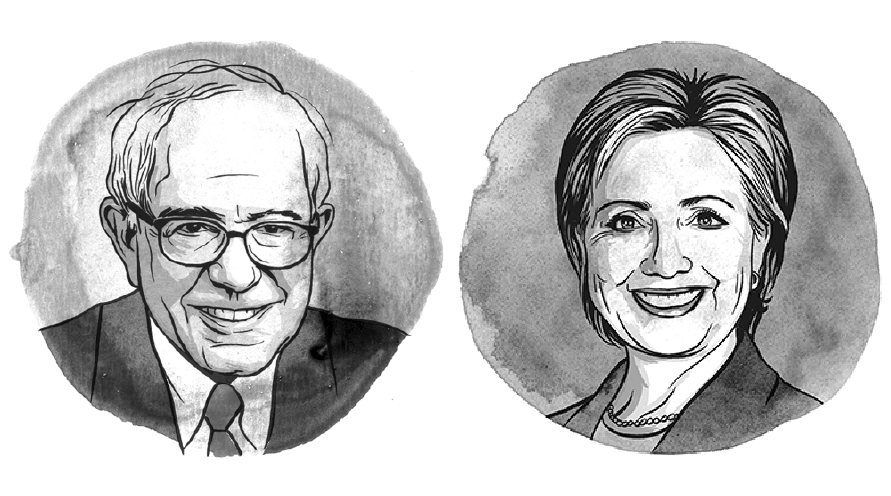Testy debate suggests Clinton and Sanders battle will continue
March 7, 2016
Hillary Clinton and Bernie Sanders engaged in one of their most testy debates on Sunday, a surprisingly combative exchange that suggested the candidates still see a close contest even if pundits think it’s all but over.
It was tame by standards of the Republican debate shoutfests, but it stood out in a more civil race, especially where Clinton appears the solid favorite to win the nomination. Clinton became the Democratic Party’s presumptive nominee last week after she swept states across the South and Southwest.
But Sanders plans to stay in the race despite huge losses, especially in Southern states with large minority populations, and a virtual inability to catch up to Clinton’s lead in delegates.
Advertisement
On issues, they used the final debate before Michigan and Mississippi primaries Tuesday to appeal to African-American voters, using the lack of clean water in Flint to hit Republicans on a series of issues Democrats are campaigning on this year, including spending on infrastructure.
Takeaway
Sanders was expected to be aggressive, but Clinton was equally confrontational. In one of their most memorable exchanges, Clinton tried to interrupt Sanders as he said that “some of your friends destroyed this economy.”
“Excuse me, I’m talking,” Sanders said.
“If you’re going to talk, tell the whole story, Senator Sanders,” she said.
Flint
Clinton and Sanders vied over who would be more aggressive defending Flint and slamming Republicans for the water crisis in the financially struggling, predominantly black city.
Advertisement*
For the first time, Clinton followed Sanders in urging that Republican Gov. Rick Snyder of Michigan resign or be driven from office over the water debacle that’s exposed children to lead poisoning. Her new stance on Snyder comes after her husband, Bill Clinton, criticized Sanders for calling for the governor to resign.
She also said that Snyder is not spending enough money to fix the problems.
Snyder responded via Twitter that he has proposed more than $230 million in aid for Flint, and $70 million has already been spent. Snyder declared a state of emergency allowing the federal government to send money.
But congressional Republicans have slowed $600 billion in aid to the city as some question whether the problem is a federal, state or local issue. After blaming only Snyder, the candidates were asked whether they also held the Obama administration’s Environmental Protection Agency accountable, but said only that an investigation needed to be conducted.
The water crisis began in April 2014, when government officials appointed by Snyder decided to switch the city’s water source to the Flint River to save money. Corrosive water ate away at the pipes, causing lead to contaminate the water supply.
Both called for repairs to “crumbling” infrastructure in Flint as well as cities across the nation but neither offered ways to pay for what would cost billions.
Race
They talked personally about exposure to racism, Sanders about protesting and Clinton about her first treks into inner-city Chicago.
“When you’re white you don’t know what it [is] like to be living in a ghetto, to be poor,” Sanders said.
Asked about understanding other cultures, Sanders talked about working with black and white students trying to desegregate the University of Chicago-owned housing and attending the march on Washington in 1963.
“Most candidates for president, don’t put this on their resume, but I was arrested by the Chicago police for trying to desegregate the Chicago school system,” he said.
Clinton talked about her youth minister in suburban Illinois insisting that students go in to inner-city Chicago to meet with kids in black and Latino churches.
“That got me thinking about what I needed to do to try to fulfill my faith,” she said.
Trade
Clinton and Sanders sparred sharply and at length over trade.
Sanders hammered Clinton for supporting what he called “disastrous” trade policies and adding that she’s too closely tied to Wall Street and corporate America.
“I was on the picket line in the 90s against [the North American Free Trade Agreement],” Sanders said of the agreement backed by Clinton’s husband. “You didn’t need a PH.D. to understand American workers should not be forced to compete” with countries that pay their workers nearly slave wages.
Clinton pushed back at Sanders, accusing him of opposing the auto industry bailout championed by President Barack Obama: “If everybody had voted the way he did, I believe the auto industry would have collapsed, taking four million jobs with it,” she said.
Sanders said he voted against the spending package because it benefited some of the Wall Street companies that he said wrecked the U.S. economy. ‘
Speeches
Sanders urged anew that Clinton release her transcripts of paid speeches to Wall Street firms including Goldman Sachs.
“I kind of think if you get paid a couple hundred thousand dollars for a speech, it must be a great speech. I think we should release it and let the American people see what that transcript was,” Sanders said.
Clinton said again she would release the transcripts only if all other candidates who have given paid speeches did. She also said that she stood up to Wall Street.
“I have a record,” she said. “And you know what, if you were going to be in some way distrusted or dismissed about whether you can take on Wall Street if you ever took money, President Obama took more money from Wall Street in the 2008 campaign than anybody ever had.”
Sanders quipped: “Secretary Clinton wants everybody else to release it, well, I’m your Democratic opponent, I release it, here it is. There ain’t nothing. I don’t give speeches to Wall Street for hundreds of thousands of dollars, you got it.”
___ (c) 2016 McClatchy Washington Bureau
Visit the McClatchy Washington Bureau at www.mcclatchydc.com
Distributed by Tribune Content Agency, LLC.
Advertisement










